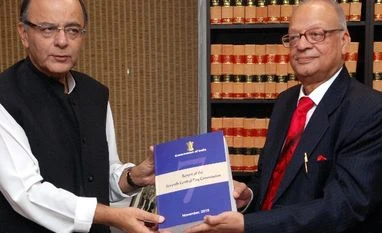The government is likely to announce the implementation of the 7th Pay Commission recommendations soon.
A Committee of Secretaries headed by Cabinet Secretary P K Sinha has submitted its report on the recommendations of the 7th Pay Commission, which may be accepted, a financial ministry official said.
Based on the panel's report, the Finance Ministry is preparing a Cabinet note and the issue may come up for approval by the Cabinet as early as June 29.
The Commission has proposed a hefty 23.55% hike in salary, allowances and pension for 4.8 million government employees and 5.5 million pensioners.
The recommendations will lead to an additional burden of Rs 1.02 lakh crore or nearly 0.7% of the GDP.
Of the total financial impact, Rs 73,650 crore will be borne by the General Budget and Rs 28,450 crore by the Railway Budget.
Also Read
Here is how government employees will benefit:
1) Entry-level employees: The entry level pay has been recommended to be raised to Rs 18,000 per month from current Rs 7,000.
2) Hike in allowances and salaries: The basic salary hike recommended is 16%, while that of housing rent allowance, other allowances and pensions are 138.71%, 49.79% and 23.63%, respectively.
3) Military personnel: The starting salary of a sepoy (the army's entry rank) has been raised from Rs 8,460 (plus grade pay and allowances) to Rs 21,700 a month. At the other end of the rank spectrum, a lieutenant general will now earn above Rs 2,00,000 per month.
New salaries in the lowest grades (Pay Band 1) will be 2.57 times higher than the existing base line salaries. This caters for a multiplier of 2.25 for merging Dearness Allowance (DA) into the salary.
According to the report, the sepoy's raised salary (2.57 times his current salary) "includes a factor of 2.25 to account for DA neutralisation, assuming that the rate of DA would be 125% at the time of implementation of the new pay as on January 1, 2016".
Higher pay bands will get progressively higher salaries "on the premise that role, responsibility and accountability increases at each step in the hierarchy". Pay Band 2 (junior commissioned officers, or JCOs) will get a higher index of 2.62; Pay Band 3 (lieutenant to major) will get 2.67; the "senior administrative grade" and "higher administrative grades" (lieutenant colonel to lieutenant general) will get a multiple of 2.72. The apex grade (army commanders) will get a multiple of 2.81, while the three service chiefs will benefit from an index of 2.78.
Military service pay (MSP) for military officers has been raised from Rs 6,000 to Rs 15,500 per month; and for JCOs and other ranks from Rs 2,000 to Rs 5,200 per month. MSP is reckoned as basic pay for the purpose of calculating DA and pensions.
4) Pension, compensation and gratuity: The Commission recommended a revised OROP-type pension formulation for civil, defence and paramilitary employees.
The Commission also recommended an enhancement in the ceiling of gratuity from Rs 10 lakh to Rs 20 lakh, reverting to a slab-based system for disability element, and that revision of rates of lump sum compensation for next of kin should be applied uniformly to defence, civil, paramilitary personnel.
In addition, the other recommendations were that paramilitary personnel should be accorded martyr status in case of death in line of duty and setting up a strong pension grievance redressal mechanism.
5) Health insurance: Introduction of a health insurance scheme for employees and pensioners has been recommended.
)